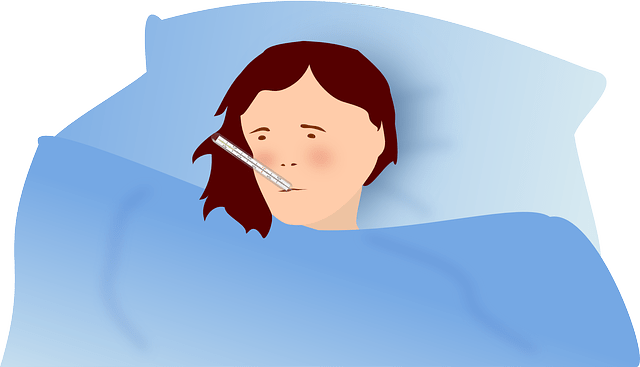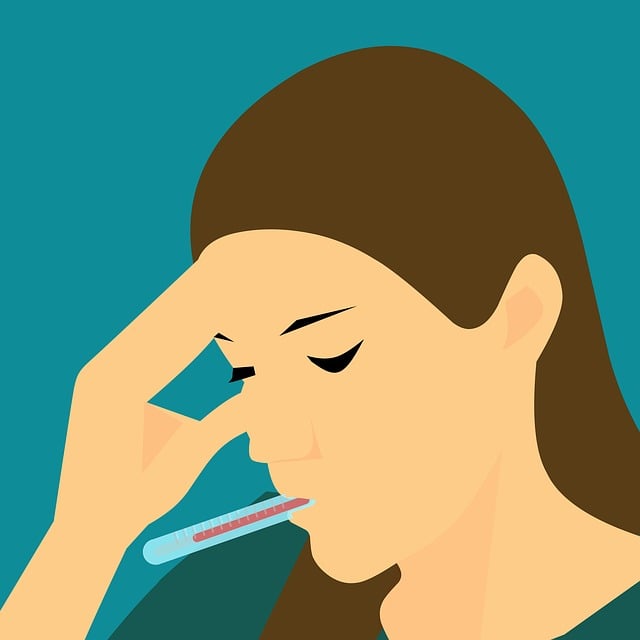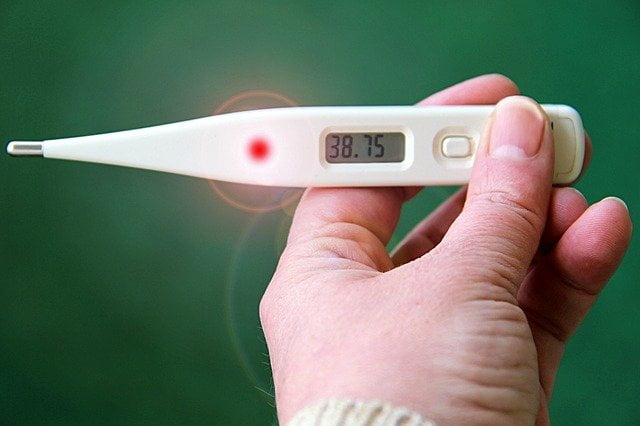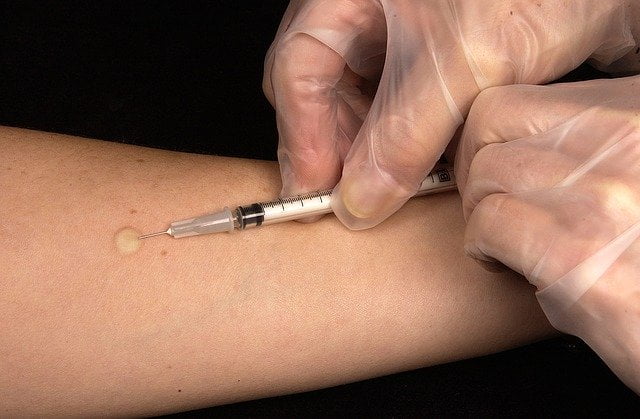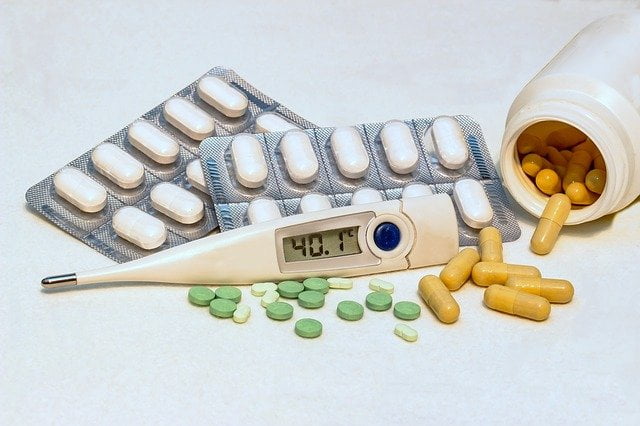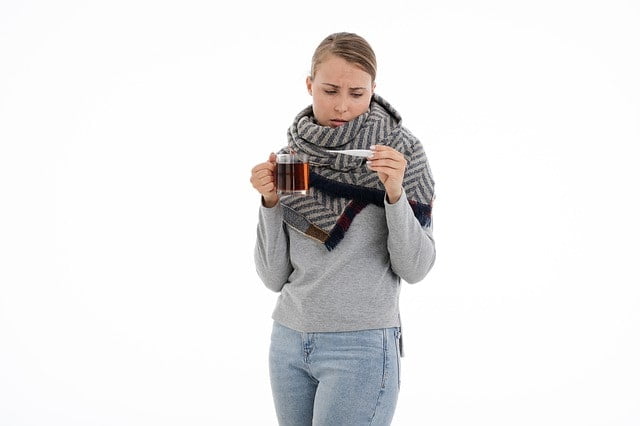What is Typhoid Fever (Enteric Fever)?
Friends, by drinking contaminated water and eating food, you can become a victim of a serious disease. And this is known as typhoid (enteric) fever.
The cause of this disease is a bacteria called Salmonella typhi. This disease can affect many parts of your body and in the absence of prompt treatment, it can be dangerous.
Typhoid (enteric) fever is a gastrointestinal infection caused by Salmonella typhi.
This bacteria enters your intestines through your mouth by consuming contaminated water or food. It stays there for about one to three weeks. After that, it enters your bloodstream through the intestinal wall. Through the bloodstream, this bacteria spread to other tissues and organs and reaches inside the cells. Today there is better treatment available for typhoid, but if not treated it can prove fatal.
High-grade fever, diarrhea, and vomiting may be the main symptoms of typhoid fever.
Typhoid fever is rare in developed countries, but this fever remains a public health problem in developing areas of Africa, South America, Central America, Southeast Asia, and the Western Pacific regions.
According to the World Health Organization (WHO), around 11 to 20 million cases of typhoid fever are reported annually worldwide, resulting in approximately 128,000 to 161,000 deaths per year.
These countries are at high risk of typhoid due to a lack of access to safe drinking water and adequate sanitation. Poor communities and vulnerable groups including children are mostly at risk.
What are The Symptoms of Typhoid (Enteric) Fever?
Friends, the symptoms of typhoid (enteric) fever appear in the person after about 1-3 weeks of coming in contact with the bacteria called Salmonella typhi. The duration of this fever can be from 3 to 4 weeks depending on its severity. Its normal incubation period is 7 to 14 days.
Symptoms of this fever usually develop slowly.
Main Symptoms of Typhoid (Enteric) Fever:
- High-grade fever
- Headache
- Diarrhea or constipation
- Loss of appetite
- Nausea
- Dry cough
- Feeling tired and weakness
- Abdominal (stomach) pain
- Enlargement of liver and spleen
- Red marks on chest
- Chills
- Muscle pains
- Weight loss
If treated on time, the symptoms of typhoid (enteric) fever start getting cured in 3 to 5 days. But if left untreated, this fever can usually get worse over the course of a few weeks and many complications may arise.
In severe cases, problems like bowel perforation, peritonitis can also occur.
Another infection called paratyphoid caused by Salmonella enterica has similar symptoms to typhoid fever, but it is much less likely to be fatal.
What are the Causes of Typhoid Fever?
Friends, the cause of typhoid fever is a bacteria called Salmonella typhi.
This fever occurs when a person consumes food or water contaminated with Salmonella typhi (bacteria).
If a typhoid patient does not wash his hands with disinfectant soap after passing feces (stool) and touches food, drink, or other objects with the same hands; then another healthy person might have the chances of getting typhoid fever infection if he/she touches these contaminated objects and eat any food item without washing hands.
Apart from this, the feces of a typhoid patient can contaminate the drinking water supply around him by flies. And after drinking that contaminated (infected) water another healthy person can also get this fever.
How is the Diagnosis of Typhoid Fever done?
Based on your symptoms, if your doctor thinks you may have an enteric fever, he or she may recommend some tests.
In the early stages, a blood sample is tested to find out whether Salmonella typhi (bacteria) is present in your body.
Apart from this, the presence of typhoid bacteria can also be detected by examining your stool (feces).
Among the blood tests, the Widal test is a popular method of diagnosing typhoid fever. But many times even after the recovery of this fever, the widal test keeps coming positive for a long time. For this situation, a better option is to have a stool culture or blood culture test.
Other tests used to detect (or diagnose) typhoid fever include enzyme-related immunosorbent assay (ELISA) and fluorescent antibody tests.
Sometimes, if the infection of this fever is high and the patient is having severe abdominal pain or vomiting, then ultrasonography is also done.
How to Prevent Typhoid Fever?
There are two basic ways to prevent typhoid fever:
- Take typhoid vaccine
- Avoid contaminated food and drink
Typhoid Fever Vaccine
Friends, the best way to prevent typhoid fever is to take its vaccine. Nevertheless, after some time the effect of its vaccine is reduced.
Therefore, if you have been previously vaccinated against enteric fever, then after consulting your doctor, you should get its booster dose.
Typhoid fever vaccine can be taken in two forms:
WHO recommends two types of vaccine to prevent typhoid fever, the first being the inactivated vaccine shot and the second one being the live oral vaccine.
Vaccine Shot
This vaccine (injection) can be taken by people above 2 years of age.
For persons in the high-risk category, the doctor may recommend a booster dose after 2 years of this vaccine.
Oral Vaccine
This vaccine can be given to people above 6 years of age. This vaccine comes in a pack of 4 tablets, and where one tablet is to be taken every second day. These tablets are to be taken one hour before the meal. When you have to visit high typhoid affected area, the doctor may advise you to take the last capsule a week before.
For people living in high-risk areas, the doctor may recommend a booster dose of this vaccine after 5 years.
This live, oral form of the vaccine is stronger than both types of vaccine.
The vaccine is not 100% effective, so care should be taken while eating and drinking.
Adverse Effects of the Typhoid Vaccine
Typhoid vaccines can also have adverse effects.
One in 100 people may experience a fever.
After the oral vaccine, gastrointestinal problems, and headaches may occur.
However, serious side effects are rare with both types of vaccines.
Live oral vaccine should not be given to an HIV patient.
Other Measures (Ways) to Prevent Typhoid (Enteric) Fever
Apart from the vaccine, there are some other measures, by adopting them, you can avoid this (enteric) fever:
- Special care should be taken for hand hygiene. Hands should be washed thoroughly with soap before eating food and after coming from the toilet.
- Always drink boiled water. Boil drinking water for about 15 minutes before drinking it.
- Food should be eaten only after it is completely cooked.
- Food utensils should also be washed with clean water.
- Raw vegetables or fruits that cannot be peeled should not be eaten i.e. they should be eaten only after cooking.
- Do not consume icy food, no matter how tasty, made from dirty water.
- If the ice is not made from clean or boiled water, then drink your beverage without ice.
- It is better not to eat or eat from the shops/places where food items/beverages are not kept clean. Such foods are more likely to host typhoid bacteria.
What is the Treatment of Typhoid Fever?
The only effective treatment for typhoid (enteric) fever is the use of antibiotics. The most commonly used antibiotics are ciprofloxacin and ceftriaxone.
Azithromycin is also used to treat it.
However, ciprofloxacin is not recommended for use in pregnant women.
If a typhoid fever patient is able to take dietary supplements, he or she is given oral rehydration therapy; to maintain fluid balance after fluid loss due to diarrhea.
But if the patient is unable to eat anything orally due to excessive vomiting, he or she is given intravenous fluids and medications to maintain fluid balance and clear the infection.
In severe cases of typhoid fever, sometimes there is also a perforation of the intestines, which can only be corrected with surgery.
What should be the Diet in Typhoid Fever?
Digestive or gastrointestinal (GI) problems occur while suffering from typhoid fever. The main symptoms of this infection include loss of appetite, diarrhea, and nausea.
Therefore, to control this fever, you should take a healthy and balanced diet.
In this fever, you should eat only easily digestible foods.
For a balanced diet, you need to maintain a balance of carbohydrates, fats, and proteins in your diet.
That is why dieticians also recommend eating easily digestible food at short intervals in it.
In order to reduce the symptoms of typhoid fever and keep its treatment process smooth, I am telling you next which foods you should eat and which you should not.
You should eat these foods:
High-calorie diet
The weight is reduced significantly in typhoid fever. Therefore it is recommended to take a high-calorie diet for this fever. Weight can be brought back to normal by consuming a high-calorie diet. This diet also fulfills the need for extra calories during illness.
Bananas, boiled potatoes, etc. are high-calorie foods.
Semi-solid food
Semi-solid food is easy to digest for patients with enteric fever. Eating foods with a high carbohydrate content can be beneficial.
Boiled potatoes, rice, etc. can be used as semi-solid food.
Liquid substance
Drinking fluids is very important because typhoid causes high-grade fever and diarrhea, which can lead to dehydration. Therefore, plenty of fluids like water, juice, etc. should be consumed. At least 3 to 4 liters of fluid should be consumed throughout the day to maintain proper fluid balance.
Omega-3 Fatty Acid
Consuming foods rich in omega-3 fatty acids help in reducing inflammation in the body.
Electrolytes
There is an excessive loss of electrolytes in this fever, so to compensate for this; you should consume soup, fruit juice, ORS solution, etc.
Protein rich foods
You must also include protein-rich foods like cheese, legumes, etc. in your diet.
Don’t eat these foods
Ghee, butter and fried foods
Ghee, butter, and fried foods should be avoided.
High-fiber foods
High-fiber foods can irritate your digestive system, so it is better not to eat them.
Spicy foods
Spicy and pungent taste substances should also not be consumed.
Red chili, vinegar, etc. should also be avoided.
Vegetables which cause gas
Apart from this, vegetables like capsicum should also not be consumed, which causes gas.
Frequently Asked Quetions
Question: Which is the best medicine for typhoid fever?
Answer: Antibiotics are the best medicine for this fever; the most commonly used of these are Ciprofloxacin and Ceftriaxone.
Question: Can typhoid fever be completely cured?
Answer: Yes, this fever can be completely cured with the help of antibiotics.
———————————————
Disclaimer: This article is intended for informational purposes only. Any information associated with this article should not be considered as a substitute for prescriptions suggested by local health care professionals.
———————————————
Recommended Articles:
1) Flu (Influenza): Causes, Symptoms, Vaccine, Treatment
2) Common Cold: Causes, Symptoms, Treatment, Home Remedies
———————————————
